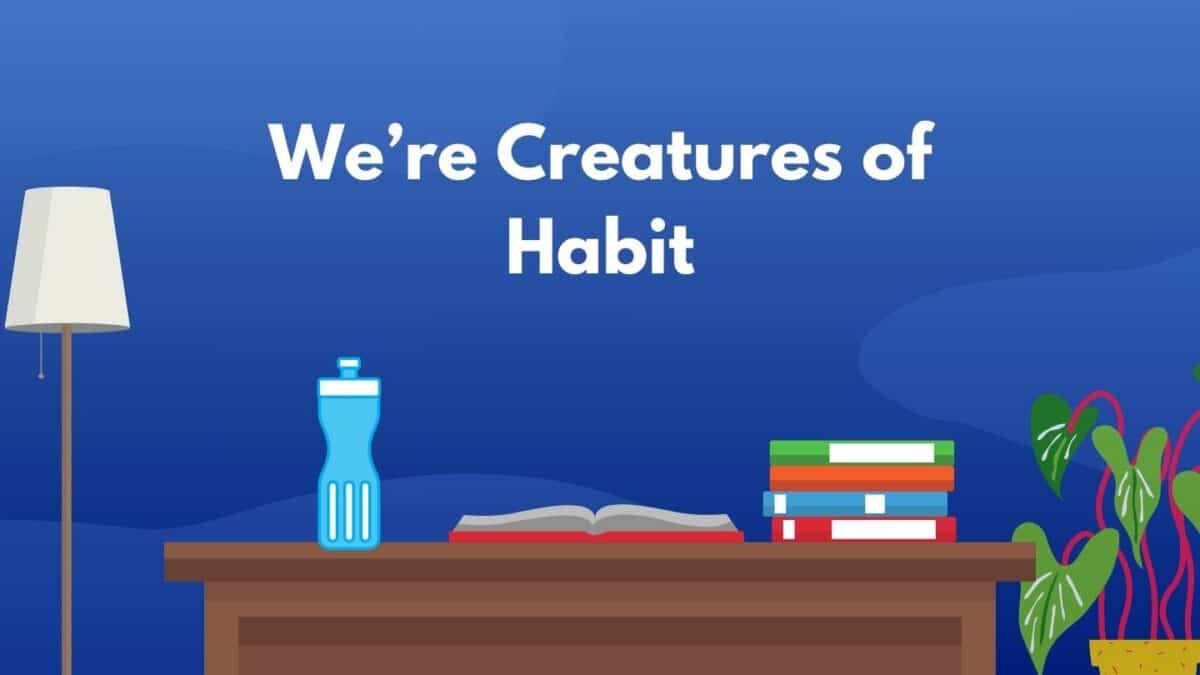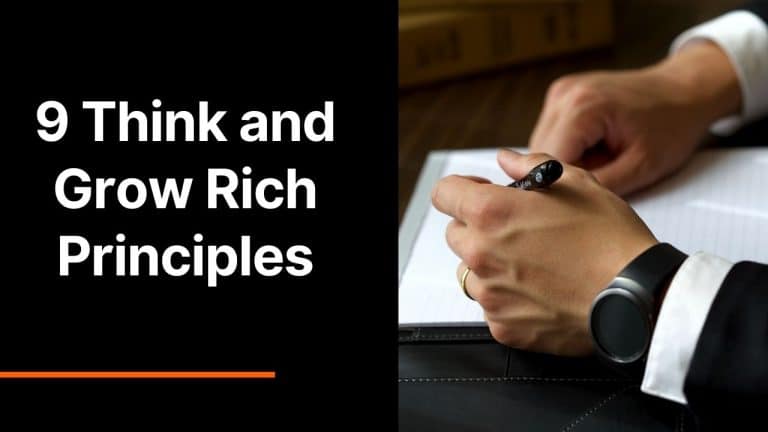Creatures of Habit: Understand and Benefit From Your Habits
As humans, we’re often nicknamed as ‘creatures of habit’.
We form and follow established routines, making our daily actions predictable.
So, in this article I want to explore how our repetitive behaviors shape our lives. How it helps us make decisions and provides a sense of security and structure. And how being creatures of habit also hinders us when faced with challenges during times of change and adaptation.
For example, have you ever caught yourself mindlessly eating food when you’re not hungry?
Even after making a New Year’s resolution you wouldn’t eat mindlessly earlier in the year.
Moments like this can make you second-guess whether your habitual actions are truly serving your interest. So let’s:
- Understand our nature as habitual creatures
- How excellence is a habit, not an act
- How to shape our lives around positive habits
- The power of habit in our personal and professional life

Understanding Our Nature as Creatures of Habit
Why are we so hooked on our habits?
Let’s take a moment to examine the basics.
The Science Behind Habit Formation
The human brain is hardwired to form habits. This neurobiological trait allows us to perform tasks without dedicating our entire mental focus to every task at hand.
This gives us the freedom to multitask and focus on more pressing or interesting topics.
And in neuroscience terms, the ‘basal ganglia’ is the part of our brain responsible for habit formation.
When we repeat a behavior frequently enough, it moves from the prefrontal cortex, responsible for decision-making, to the basal ganglia, and becomes automatic.
Why We Form Habits
In an ever-changing world, our routines and habits give us a sense of control and security. These repetitive behaviors help us feel safe and competent in our environment as they ease pressure and reduce stress.
These unconscious behaviors dictate a significant portion of our lives and actions.
- Be it brushing our teeth first thing in the morning
- The route we take to work
- Or the time we drink our coffee
They are all manifestations of our inherent, habit-prone nature.
Next, let’s explore what this means for excellence.
Excellence In Life is a Habit, Not an Act – Using Your Habits to Your Advantage
It’s common to perceive excellence as a spontaneous or sporadic accomplishment. An act that periodically sparks into existence.
But, looking deeper, we can see a different reality.
“Excellence then is not an act, but a habit.”
This quote, often attributed to Aristotle, sheds light on the transformative potential of our habits!
Excellence Blossoms With Consistency
People often mistakenly consider excellence as a one-time act. Or an infrequent burst of exceptional results.
But, truly sustainable excellence is based on daily actions and characterized by our ability to stay consistent.
Small decisions combine into a series of habits that lead to excellence.
Every decision to take action, and persevere in the face of hardship or challenging circumstances, is a stepping stone towards achieving excellence.
Building Excellence Through Habits
Think of some famous entrepreneurs, like Steve Jobs or Oprah Winfrey.
They didn’t achieve their status by one lucky act. No.
Instead, they had created a series of habits that led them to becoming who they are.
- Steve Jobs, co-founder of Apple, was known for his habit of thinking differently, questioning the status quo, and constantly innovating. His daily life reflected this habit, leading to revolutionary products such as the iPhone.
- Media Mogul Oprah Winfrey did not rise to stardom overnight. Through consistency, self-belief, and hard work — habits she honed over time – were her stepping stones to a remarkable career.
We need to view the road to excellence as a brick path where each brick represents a habit.
These bricks pave the way to achieving our goals. As each minor accomplishment is a building block leading to victory.
How to Create a Habit of Excellence
So, how do you create a habit of excellence?
Excellence isn’t something that can be achieved in 10 minutes. But with time, effort, and learning some lessons, you’ll be well on your way.
Here are some helpful tips:
- Develop Consistent Habits: Consistent routine helps foster excellent results. Make a plan and stick to it. Repetition is a key factor in habit formation.
- Prioritize Your Actions: Understand what actions contribute to your goals. Make these actions a priority in your routine.
- Learn From Mistakes: Don’t let mistakes or failures discourage you. Treat them as learning opportunities and use them to improve your habits.
Through understanding your habits. What motivates you? And nurturing your positive actions into daily habits, you can make excellence a lifestyle.
Not just a goal.
Each day, through each habit, we draw closer and closer to realizing our highest potential.
Shaping Our Lives Around Our Positive Habits
The brilliance of the human brain allows us to learn quickly from our experiences and establish patterns – we become creatures of habit.
Harnessing the power of habit formation, we can shape our lives around behaviors that bring us the greatest health, happiness, and success.
The Power of Intentional Habit Formation
Intentional habit formation can be transformative.
We can bring about meaningful changes in our lives by practicing habits that align with our values and objectives.
We mentioned earlier the origins of our habits and how habits emerge because our brains are always on the lookout to save effort.
So, if we develop an understanding of this process, we can gain insight into how to change our habits.
Enter the habit loop.
Research has revealed 3 components to a habit: the cue, the routine, and the reward. This ‘habit loop’ has great implications for how we can intentionally form positive habits.
And now that you’re aware of it, how can you intentionally use it to form the habits you desire?
Using The Habit Loop to Lay the Blueprint for Positive Habits
To change a habit—or form a new one—you have to start with understanding your existing habit loop.
- Identify The Routine: To shape our lives around positive habits, we must first recognize the behaviors we want to change or establish.
- Experiment With Rewards: Understanding what we gain from our habits (satisfaction, pleasure, relief) can help us choose better alternatives that deliver the same reward.
- Isolate The Cue: Every habit has a trigger. Identifying the cues for our habits is key to reshaping them.
- Have a Plan: Once we’ve identified the habit loop components, we can create a plan to change our unwanted habits or create better ones.
The Role of Determination and Consistency in Forming New Habits
Forming new habits and breaking the old ones is not an easy task. It requires a strong commitment, persistence, and resilience.
- Determination: Commitment to our decision to form a new habit is necessary. If we have enough self-belief and determination, we can train our minds to adapt to new patterns.
- Consistency: Habits aren’t formed fast. The action needs to be carried out consistently over a period of time for it to become second nature. For example, 2-3 months.
Yes, mastering the power of habit formation takes time and effort.
But the power to reshape our lives and pursue excellence lies within our habits. And when our good habits become second nature, we have limitless potential.
Both personally and professionally.
The Power of Habit in Our Personal and Professional Lives
Habits are at the figurative steering wheel of our actions.
When we learn to take charge of our habits, we can direct our lives towards more meaningful and positive outcomes.
So, let’s now look at the influential our habits in various aspects of our lives.
Real-Life Examples and Observations
The lives of successful individuals show the strength of habits.
- Michael Phelps, the most decorated Olympian of all time, had a routine that led him to perform exceptionally under pressure. This was not an act of luck, but an outcome of a firmly established habit.
- Steve Jobs made a habit of wearing the same black turtleneck, blue jeans, and sneakers.
But, on a more everyday note, think about your morning routine.
Let’s say you always brush your teeth, have a cup of coffee, and read the news on your phone in that order. That’s a habit at work.
For me, it’s something similar. But instead of the news, it’s waking up and writing.
Habits streamline your day and minimize your decision making.
Habits in Our Personal Growth, Relationships, and Health
- Personal Growth: The cultivation of positive habits majorly influenced the journey of personal growth and self-improvement. Regular reading, meditating, or practicing a new skill can lead to profound personal development.
- Relationships: Our interactions with others often revolve around habitual patterns. Whether it’s a routine phone call to a long-distance friend. A standing weekly movie night with a partner. Or a habit of expressing gratitude. Our habits help nurture relationships.
- Health: Our health results from our habits. Regular exercise, a healthy diet, and sufficient sleep are all examples of habits that contribute to your wellbeing.
Habits in Career Growth
Our professional success is largely the sum of our work habits.
- Productivity: Effective work habits, such as tackling important tasks first thing in the morning, can boost productivity.
- Developing Skills: Mastering any work-related skill is all about practice—a habit of dedication to continuous learning.
- Leadership: Becoming an effective leader also depends on our habits. For example empathetic communication, showing appreciation, and our ability to plan strategically.
Maintaining Good Habits and Breaking The Bad Ones
Here’s my advice on developing your good habits and eliminating negative ones:
- Incremental Changes: Start small. Big changes can be daunting and hard to maintain. By making small shifts, we can achieve more sustainable changes.
- Detect Your Triggers: Seek to understand what prompts your habits—the good and the bad. This will give you greater control over them.
- Replacing Habits: When striving to break a bad habit, try to replace it with a good one. It’s easier to swap a negative habit with a positive one rather than eliminating it altogether. I think something needs to fill the void left by your bad habit.
Habits, the quiet architects of our lives, can 100% shape our personal and professional lives.
Recognizing this and using it wisely to our advantage can catapult our lives on a path of profound growth.
Police Yourself Because We’re All Creatures of Habit
In this exploration of the concept that we ‘re “creatures of habit,” we have delved into the various ways our habits shape us.
We also touched on how to harness this understanding for personal and professional growth in our lives. Here are some of the key takeaways:
- We are indeed creatures of habit, and this trait is rooted in psychology and neuroscience.
- Habits form through repetition, and they can significantly define our lives. They provide us with a sense of familiar patterns, reducing stress and promoting comfort.
- “Excellence then is not an act but a habit” captures the transformative power of having positive habitual actions. There are many examples of individuals who have embraced this mantra to great success.
- We can consciously form beneficial habits and dismantle harmful ones. Such transformations require determination and consistency.
- Our habits affect our personal growth, relationships, career, and health.
- We can benefit both personally and professionally by sticking to good habits and getting rid of bad ones.
To improve ourselves and our life, we need to consistently take small actions towards excellence. Because you are what you do repeatedly.
Frequently Asked Questions About Habits
1. What exactly does it mean to be a ‘creature of habit’?
Being a ‘creature of habit’ refers to our inherent tendency to form and follow set patterns or routines in our lives. These habits, born of our repeated actions, can profoundly influence our behavior, choices, and ultimately, our identities and lives.
2. How do habits shape our identities and daily lives?
Habits, being repeated actions, form our responses and reactions to different stimuli. They influence our choices, behavior, and mindset. Which significantly molds our identities. They also bring a sense of regularity and predictability in our daily lives, reducing stress.
3. How can we use habits to our advantage?
By understanding how habits work, we can intentionally form beneficial ones and eliminate harmful ones from our life. Such proactive habit formation can significantly elevate our personal performance, career advancement, and wellness.
4. How does one form a new, positive habit?
Forming a new positive habit involves identifying a desirable action. Setting clear, achievable goals, and doing the action regularly until it becomes second nature. So, remain persistent and consistent.
5. How can we break free from a negative habit?
Breaking free from a negative habit involves recognition, motivation to change, substitution with a positive habit, and continuous effort. Remember, it’s a gradual process which needs patience and determination to overcome.






